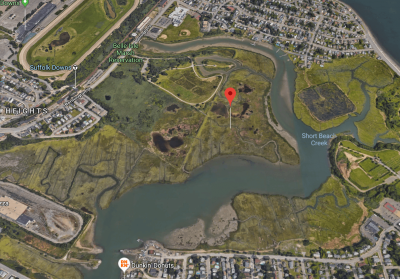
Boston City Councilors Michelle Wu and Matt O’Malley are pushing to strengthen protections for local wetlands, with the hope of improving Boston’s ability to fight climate change via an ordinance filed at the end of January.
Called the Wetlands Protection Act, the proposal would allow the Boston Conservation Commission to demand that green infrastructure is developed in tandem with new construction projects and includes protection for wetlands within the city.
Wu wrote in an email statement that the ordinance is designed to promote climate change adaptation, given that wetlands help offset the negative effects of climate change and pollution. She noted that these resources will become increasingly valuable as climate change worsens.
“[The ordinance would] explicitly adopt climate change adaptation as a resource area value,” Wu said. “Wetlands are important not just for conservation of open space and wildlife habitats, but to manage rain, flooding and heat.”
Wu wrote that especially in light of the United Nations Intergovernmental Panel on Climate Change report published last fall, that predicted the planet had 12 years until it hits the greenhouse gas threshold, Boston needed to reinforce its land use guidelines as the city is one of only three Massachusetts coastal municipalities without regulations above what is protected in state laws.
“We must take every possible action to reduce energy demand, increase renewable energy supply, and transform our land use policies to align with climate change mitigation and adaptation,” Wu wrote.
Amelia Croteau, the executive secretary for the Boston Conservation Commission, said that ever since a 2016 Climate Ready Boston report called for protection against extreme temperatures and sea level rise, advocates have been working toward a solution.
“I think that the Wetlands Protection Ordinance is one of the many steps we can take to move that forward,” Croteau said.
Lauren Zingarelli, director of communications and community engagement at the City’s Office of Environment, Energy and Open Space, said the plan has significant backing from both community groups and property owners.
“With this being a part of our Climate Ready Boston strategy to prepare the city for the impacts of climate change,” Zingarelli said, “the City of Boston and the Mayor have been really met with extreme partnership.”
However, Zingarelli said that potential unintended effects of the ordinance on areas such as Boston’s housing market remain uncharted.
“Really early in the development of the ordinance we could really have an understanding of that,” Zingarelli said, “so I think we look forward to better understanding [housing market] impacts, and that’s something we’re eager to work with City Council on.”
Wetlands are water ecosystems that contribute to public and private water sources, animal habitats and protection from flooding. Tidal or coastal wetlands have been known to prevent pollution and land degradation along shores — problems that will likely become worse with climate change — according to a 2017 report from the Massachusetts Department of Environmental Protection.
In 1972, the Massachusetts Legislature combined the Jones and Hatch acts to form the Wetlands Protection Act. The Wetlands Protection Act protects important water-related lands, including swamps, floodplains and riverfronts.
Each year, approximately 5,000 permits are issued by the DEP for construction projects that may alter wetlands, according to the DEP’s report. Massachusetts regulations then require that all disrupted wetlands be replaced.
More 50 percent of the projects were not in compliance with regulations, and more 20 percent failed to even begin replacement efforts, according to a Bio One study that analyzed 114 field sites between 1983 and 1994.
Louis Demarco, 22, of Medford, said that areas such as wetlands possess “the essence of nature” and should be protected from construction projects by the government.
“Although I do believe there’s always time for construction, I really feel that wetlands should be left alone because it’s been a part of the ecosystem longer than we’ve been here,” Demarco said, “so I think it’s not the best to meddle with it.”
Lexington resident Gayle Harris, 68, said it is important to protect green spaces in the city, such as wetlands and the Boston Public Garden, as they allow Boston residents to gather and take time to enjoy nature.
“You see all kinds of people, all ages, all ethnicities, you see humanity here enjoying the birds and the squirrels and the flora and the fauna,” Harris said. “You see dogs walking, like mine. I think it is a gem. It is like a precious jewel in the life of the city.”
Genc Rexhepaj, 38, of Raynham, said he spends much of his free time in green spaces and does not think nature should be interrupted by a building.
“It’s all good, all summer you get to see the birds, there’s a lot of movement, and it’s pretty,” Rexhepaj said. “I hang around a lot on Carson beach, Castle Island. I go sometimes to the bicycle route, … I would rather have a park than a big building.”




















































































































